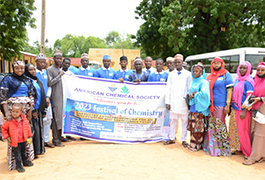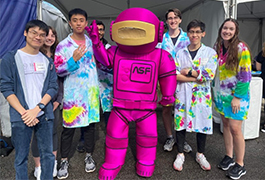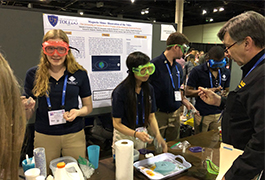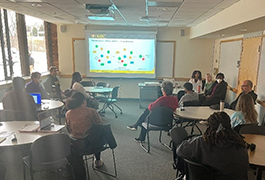ACS Student Chapters Honored with Green Chemistry Awards 2019-2020
By Aurora Ginzburg, ACS Green Chemistry Institute
The ACS Green Chemistry Institute selected 22 ACS Student Chapters to receive Green Chemistry Awards in recognition of activities they performed during the 2019-2020 academic year. Congratulations to all of the recipients! To qualify for this award, a chapter had to complete at least three green chemistry (GC) activities. These activities had to incorporate distinctly GC ideas like maximizing resource efficiency while reducing negative impacts on human/environmental health and safety.
Despite the pandemic interrupting spring semester for most students, we were pleased to see the many creative ways that ACS Student Chapters brought green chemistry into their chapter activities.
Here are a few of the highlights.
A number of chapters had webinar watch parties, both virtually and in-person, for live or archived ACS green chemistry presentations. Salt Lake Community College had the neat idea to do a GC-inspired activity before and during a webinar on ocean plastics. In the spirit of a circular economy, students learned to weave single-use plastic shopping bags into durable, reusable bags, thereby improving bag performance and prolonging the length of time they can be used before being recycled.
Some chapters were able to host seminar speakers with expertise in GC research covering areas such as solventless mechanochemistry and catalysts for carbon dioxide reduction. The University of Puerto Rico, Mayaguez Campus, had a green “chem-off” where teams competed to select a green boat fuel by considering GC principles. We love to see students practice green design and consider trade-offs in chapter activities.
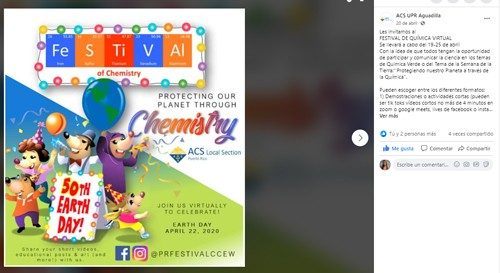
The Green Chemistry division of the University of Puerto Rico, Aguadilla, student chapter hosted several activities for Earth Week event where the twelve principles of Green Chemistry were explained. Easy and safe home experiments were distributed to members. Lucas López wrote several blog articles for Red Planet highlighting alternative fuel sources being considered to power rockets, usage of renewable feedstock, and how microorganisms create fertile soil from human waste. And chapter member Yadielis Torres discussed the advantages of bioplastics and the chemistry behind their production in a Green Chemistry blog article.
Students used classic chemistry demonstrations, for example, elephant toothpaste or cabbage pH indicators, to teach GC concepts like catalysis and safer chemicals, respectively. Although many chapters used chemistry demos to discuss GC, we have to acknowledge the passion of Western Washington University students who participated in five different demo events, including one at a museum.
A number of undergraduates are doing GC research and had opportunities to showcase that research to a range of audiences. Research topics included: solar panels, greener pesticides, biopolymers, and a green adaptation of a teaching lab. Students at West Virginia State University even had the opportunity to present their research at the state capitol building during Undergraduate Research Day.
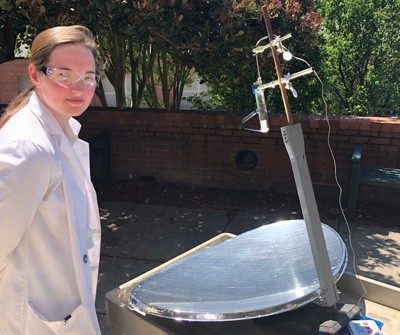
For their annual National Chemistry Week Student-Faculty Meet and Greet event, Augusta University’s chapter president Caroline Hammond set up a solar reflector that she uses in her personal research to demonstrate solar heating. She showed how easily a container filled with water can be heated with just the sun as a source and incorporated the 12 Principles of Green Chemistry into her presentation.
Some students made use of the ACS Program-in-a-Box to teach GC topics. In order for these to qualify as GC activities, the chapter had to specifically mention the chemistry details that were discussed in a GC context and why they were green. For example, Saint Francis University students used “Marvelous Metals Program-in-a-Box” to discuss the role of organometallics in society and how it is important to consider metal abundance and move away from the use of rare metals. As another example, Tarleton State University students used “The Future of Food” program and had a discussion on the use of chitin from crustacean shells in the production of biologically based plastics.
Many student chapters had lessons on the 12 Principles of Green Chemistry with audiences ranging from the chapter members to the local community. A few chapters made GC principles and ideas into competitive learning games, including a poster-creation contest (Salt Lake Community College), a scavenger hunt (University of Puerto Rico, Cayey), and even an escape room (Wheaton College).
With the COVID-19 pandemic preventing in-person events, students found ways to adapt GC activities and implement them virtually. The University of Puerto Rico, Aguadilla, chapter converted their planned GC activities into a green chemistry student blog with entries on bioplastics and GC in space. Students at West Virginia State University made posters for the ACS Virtual Spring National Meeting. Augusta University students provided local preschool and kindergarten teachers with virtual GC coloring pages and teaching materials to celebrate Earth Day.
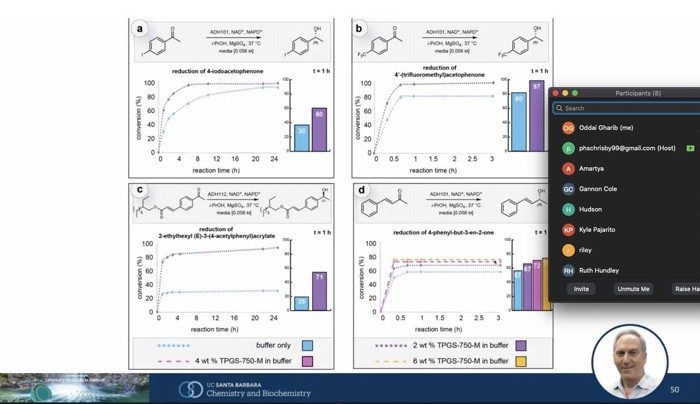
Due to COVID-19, many chapter activities were cancelled. To adapt to this unprecedented situation, officers from West Virginia State University organized a Zoom meeting to stream an archived Green Chemistry webinar, "The Future of Organic Synthesis is in Water: From Chemo- to Bio-catalysis." Students enjoyed being able to watch the webinar and communicate from the comfort of their homes.
ACS Student Chapter Green Chemistry Awardees
(2019-2020)
- Augusta University
- Florida International University-Biscayne Bay Campus
- Inter American University of Puerto Rico Ponce Campus
- Saint Francis University
- Salt Lake Community College
- South Dakota School of Mines and Technology
- Swansea University
- Tarleton State University
- Tennessee Technological University
- Texas Christian University
- The Pontifical Catholic University of Puerto Rico
- University of Florida
- University of New England
- University of Puerto Rico at Cayey
- University of Puerto Rico, Bayamon Campus
- University of Puerto Rico-Aguadilla
- University of Puerto Rico-Mayaguez Campus
- University of Puerto Rico-Rio Piedras Campus
- University of Toledo
- West Virginia State University
- Western Washington University
- Wheaton College
This story first appeared in the Green Chemistry Institute Nexus Blog on December 9, 2020.

